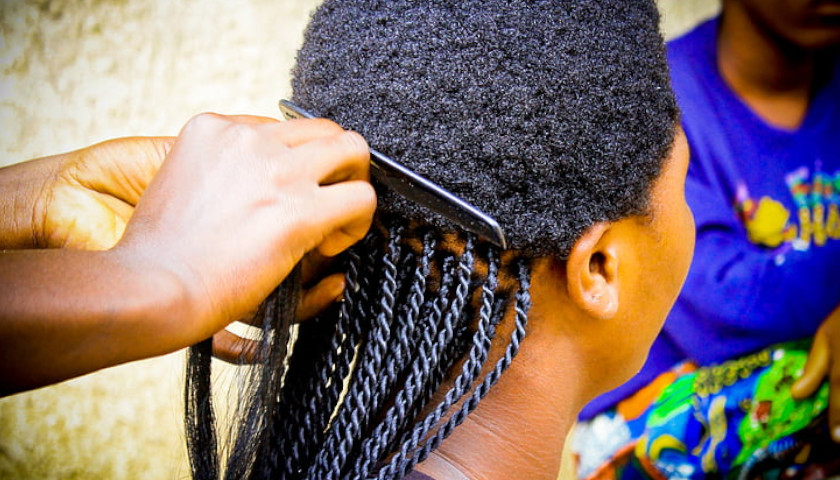by Anthony Sanders
Robbing a bank is a crime everywhere. But in some places and times you could become a criminal just by growing vegetables, feeding the homeless, playing poker or working without a government-mandated license.
African immigrant Tedy Okech risked arrest when she started working as a hair braider. She learned the craft in her youth by practicing on her mother and sisters. When she settled in Idaho in 2005, she found neighbors willing to pay for her skills. Soon she had a thriving side gig, which supplemented her income as a part-time insurance agent.
Everyone was happy except the cosmetology police, who mandated she take hundreds of hours of school and earn an occupational license. Rather than comply, Okech filed a constitutional lawsuit, prompting Idaho lawmakers to pass licensing reforms in 2022. My public interest law firm, the Institute for Justice, represented her.
The case highlights the importance of unenumerated rights — the ones not mentioned anywhere in the Constitution. A complete list of things people may do without government permission would fill volumes. Even then, certain rights might slip through the cracks, such as the right to braid hair.
Rather than risk omissions, the framers added the Ninth Amendment to the Bill of Rights as an etcetera clause, saving gallons of ink. Using simple language, it expands the Constitution to guarantee not just enumerated rights, but “others retained by the people.” Words with similar effect, but applied to the states, were then added after the Civil War, protecting Americans’ “privileges or immunities.”
Okech should have been safe, but two problems have emerged since these amendments. First, judges and legal scholars have found ways to explain them away. Mostly they just ignore them. The Supreme Court has yet to cite the Ninth Amendment as the primary basis for a single opinion.
Second, policymakers discovered they could skirt the Constitution with little pushback from the courts, especially when it comes to unenumerated rights — which too often get second-tier status. Results over the decades have ranged from bizarre edicts, such as rules against ice cream on cherry pies in Kansas, to serious privacy invasions, such as prohibitions on private school attendance in Oregon.
The legislative overreach has continued in modern times. Miami Shores, Florida, prosecuted Hermine Ricketts and Tom Carroll in 2013 for growing vegetables in their front yard. Bullhead City, Arizona, arrested Norma Thornton for feeding the homeless at a public park in 2022. And Oklahoma criminalized tattooing from 1963 to 2006.
Many jurisdictions also restrict poker, home-baked cookie sales and educational choice. New York parents violate the law if they homeschool their children without submitting annual instruction plans and quarterly reports to the state by mandated deadlines.
Meanwhile, 17 states continue to license hair braiders. Montana was on the list until April 21, 2023, when Gov. Greg Gianforte signed a bill following Idaho’s example.
States routinely infringe on unenumerated rights. Lawmakers meet, debate and vote, giving the appearance of legitimacy to their actions. Citing the Ninth Amendment does not help when code enforcers accuse you of breaking the law—a real occurrence for hair braiders and others.
My new book, “Baby Ninth Amendments,” explores a second line of defense. State constitutions, which can expand federal guarantees of individual rights, often contain Ninth Amendment variations. These clauses, informally called “Baby Ninths,” can help rein in policymakers when they restrict safe and common activities without providing compelling reasons.
Courts typically avoid giving these Baby Ninths their due. The implications are too great. As one Iowa Supreme Court justice hysterically noted in 1869, the result would be an “unwritten Constitution” protecting all the absolute rights of the people.
Courts prefer to pick and choose when recognizing unenumerated rights. So, they make up distinctions without differences, which usually boil down to “I like these rights and not those.” Then they apply various standards of review, which they can calibrate to get desired results.
If nothing else, courts are creative. But instead of exercising the mental gymnastics necessary to protect only the unenumerated rights they like, state judges simply could activate their Baby Ninths, which are well-disposed to protect all unenumerated rights.
Judges might resist such bold action, but this is not their choice to make. People often decry judges seizing power and legislating from the bench, yet the reverse scenario is far more common: Judges shrinking from their responsibility to apply constitutional commands.
This is what happens when courts ignore a Baby Ninth — they abdicate a responsibility the people have placed in their hands. Bank robbers deserve punishment, not hair braiders.
– – –
Anthony Sanders is the author of “Baby Ninth Amendments” (University of Michigan Press, 2023). He is a senior attorney and director of the Center for Judicial Engagement at the Institute for Justice in West Lakeland, Minnesota.








